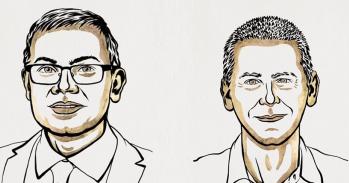In this video interview with John Gurdon, who was awarded the Nobel Prize in Physiology or Medicine on Monday, he talks about the research that revolutionised a field, his hopes for the future, and that now legendary school report.
In this video interview with John Gurdon, who was awarded the Nobel Prize in Physiology or Medicine on Monday, he talks about the research that revolutionised a field, his hopes for the future, and that now legendary school report.
If you’re really interested in something, keep going – don’t give up.
Professor Sir John Gurdon
It was 8:30am when Professor Sir John Gurdon took the call from the Nobel Assembly, and he was already in the lab. 50 years since the ground-breaking stem cell work that led to this week’s announcement of his Nobel Prize in Physiology or Medicine, and Sir John’s passion for scientific research remains unwavering.
In the above interview Sir John discusses his life’s work, which the Nobel Assembly said “revolutionised our understanding of how cells and organisms develop”. He talks about how he started experimenting with the idea of stem cells, and his belief that the law should not prevent people who are seriously ill being able to benefit from this kind of science.
Sir John even goes on to predict that within 50 years we will understand everything about how cells work and how embryos develop, with the probable exception of the brain.
The Nobel Assembly made the announcement on Monday that Professor Sir John Gurdon has been awarded the Nobel Prize in Physiology or Medicine for 2012, along with Professor Shinya Yamanaka, for proving that mature cells can be reprogrammed to become immature ‘stem’ cells, capable of developing into all tissues of the body.
It was previously believed that once a cell reached a level of maturity and became specialised, creating the various tissues that make up the organs and elements of a body, it was an irreversible, one-way process – that the fate of the cell is permanently locked.
Sir John discovered in 1962 that the specialisation of cells is in fact reversible when he eliminated the nucleus of a frog egg cell and replaced it with the nucleus from an already mature and specialised cell, lifted from a tadpole.
The modified frog egg developed into a normal tadpole, proving that the mature cell still contained the necessary DNA to develop all cells in the frog – effectively cloning the tadpole.
As the Nobel Assembly points out, he thus proved that the nucleus of the mature cell “had not lost its capacity to drive development to a fully functional organism.” This discovery revolutionised cell biology, leading to the establishment of new research areas and eventually the cloning of mammals.
Sir John’s journey to the highest level of science was not straightforward, and had something of a bumpy start. On a shelf in his Cambridge office, Gurdon still keeps a framed copy of a school report from Eton College when he was 15 years old. His teacher at the time describes Gurdon’s scientific ambitions as “quite ridiculous”, due to the fact that “he will not listen, but will insist on doing his work in his own way”.
In the interview, Sir John talks about the now infamous report, and the life he’s spent defying its assessment to join the ranks of the Nobellists. He explains why he was bottom of the class in science at school, and how his mother helped him to pursue his interest in science despite the greater likelihood of him studying Classics.
The story of Sir John’s achievements, despite his teacher’s damning estimation early on, has led to various comment pieces in the press about labelling a child’s ability, potentially crushing future dreams. But for Sir John, students should never be disheartened by initial failures at school:
“If you’re really interested in something, keep going – don’t give up”.
Professor Sir John Gurdon was born in 1933 in Dippenhall, UK. He received his Doctorate from Oxford University in 1960 and was a postdoctoral fellow at California Institute of Technology. He joined the University of Cambridge, in 1972 and has served as Professor of Cell Biology. Gurdon was Master of Magdalene College from 1995 to 2003 when he was succeeded by the current Master, Duncan Robinson.
John Gurdon is the 89th Cambridge affiliate to be awarded a Nobel Prize.
This work is licensed under a Creative Commons Licence. If you use this content on your site please link back to this page.





